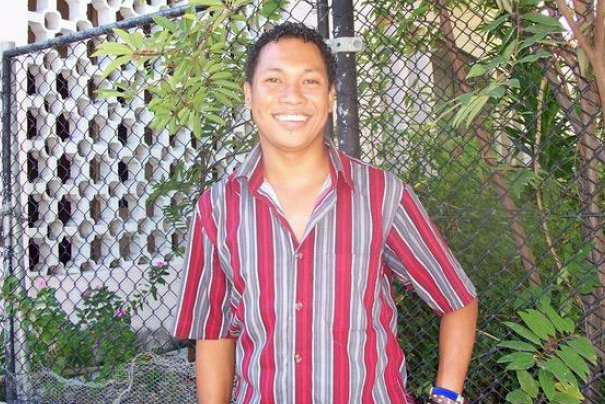
The huge amount of work in justice and charity organised for our northern neighbour, Timor-Leste, by Sisters Josephine Mitchell and Susan Connelly is well known. Less known are the individual cases of people they helped.
In response to Bishop Belo’s request for assistance in literacy and health needs, Sr Josephine established the Mary MacKillop Institute of East Timorese Studies (MMIETS). Sr Susan, a competent musician and author, was Sr Josephine’s ready first assistant.
After Timor-Leste gained independence, it was decided to bring a choir to Sydney. Twenty-three members of the St Cecilia’s Choir, Dili, arrived in November 2000 and toured NSW for five weeks. Their accompanist was the 16-year-old António de Padua Martins Soares. The young people were encouraged by Sr Josephine to each plan for their future, and to verbally express their dreams. Some wanted to serve as police, some to teach, or to start a business.
Then there was António, their accompanist, with his ready smile and irresistible charm. He had a marvellous sense of music, a singing voice true to pitch, led the choir in the church, but hardly knew a word of English. What did António think he might do when he left school? However way it was expressed in Tetun, António’s confident answer came over as “I want to be a concert pianist.”!!!
Sisters Susan and Josephine were inwardly amused knowing that the minimum requirement for a “concert pianist” in Australia, would be a Licentiate in Performance by some recognised international music school. But no one smashed the dream. Sisters Susan and Josephine put a notice out to Josephite music teachers: Would anyone be prepared to take on António from Timor-Leste as a private student?
For me this was a missionary challenge so was delighted when Sr Josephine accepted my offer. António came to Australia not long after and soon was manipulating Sydney public transport.
When António and I met, his English was conversationally non-existent. At my invitation he played something from his existing repertoire and his musicality was obvious. We got to know each other developing a pure legato of scales in various keys. At the same time António began picking up English via Music Theory. He was a keen student with a voracious appetite for learning.
I decided we would work with the AMEB music syllabuses. He knew the notes as doh, re, me in Tetun, but gradually moved to A, B, C. Within a month we were looking at AMEB Piano Grade 2 which he sat for and passed that year. For the obligatory AMEB ‘extras’ we chose the most demanding quality music he had already learned so that his classical repertoire was preserved. The second year he successfully did Grade 4, the third year Grade 6 following the same principles. By that time António was speaking English fluently.
The decision for António to attempt AMEB Grade 7 Piano, with a programme of six works of such a high standard, plus Fourth Grade Theory, was not taken easily. It meant a lot of work for both of us. One can imagine the delight of all when António gained AMEB Honours for Grade 7. António had not come just to learn the piano, however. Australian friends of Timor-Leste wanted to give this young musician all the exposure they could offer. He played at concerts wherever he was asked.
And… what about the ‘concert pianist’ dream? Our own Australian internationally renowned concert pianist, Simon Tedeschi, came forward. Simon ‘just happened’ to be giving recitals across Australia and had the desire to bring António and Timor-Leste to the attention of Australian audiences.
Following Simon’s recitals at the Sydney and Melbourne Town Halls, he introduced António, who then played for Australian audiences in both capital cities. Other great Sydney musicians like Rachel Scott, Ros Dunlop, Wendy Dixon and Erica Booker opened doors for António. In the Northern Territory he performed with the Darwin Choral Festival conducted by Norah Lewis. After Grade 7, the Sisters of Saint Joseph financed António’s studies to the International School of Music (Harris Park) where he gained a Teaching Diploma.
So, António returned to Timor-Leste as a respected liturgical musician and teacher. He became a staff member at Mary MacKillop Today and led the team-teaching sessions for Early Childhood Music to pre-primary and primary children around Dili and districts. While continuing to direct Saint Cecilia’s choir “Balide” he also taught piano students. In more recent years he helped develop and conduct the Mobile Learning Centre of Mary MacKillop Today to children in remote areas.
Canonisation
Life went on as ‘normal’ for Josephites in Australia until 2010 when word came, to the great delight of all, that our own Mother Mary MacKillop was to be canonised in Rome as Australia’s first saint. My personal joy knew no bounds to learn that António had been chosen to be acolyte and had flown to Rome. The papal ceremony was livestreamed to TVs across the world. I was invited by the Parish Priest to speak to the congregation at the Ashfield Masses that day. I could hardly control my emotions telling of my joy watching António in liturgical robes preceding the pontiff.
What of the present?
Mr António Soares is now a multi-tasked musician and teacher in his own country. For the last six months he has worked with the educational programme HANDS (acronym in Tetun for Halimar, Aprende, no Deskobre, Susesu – Play, Learn, and Discover, Succeed) with the New Zealand company Grow and works together with the Timorese Ministry of Education. New Zealand has strengthened cooperation for the HANDS 2 program in preschool education. In his ‘free time’ António conducts, accompanies and composes – a Mass in Eb, several psalms and Alleluia settings have come from his pen – for several choirs, including that of St Cecilia.
Marie Therese Levey rsj
With thanks for assistance by Sisters Josephine Mitchell rsj and Susan Connelly rsj
